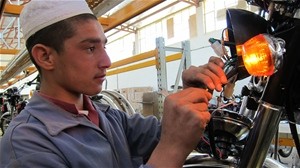
A young apprentice installing electronics at the USAID-funded motorbike assembly project.
LCEP-2/Peter Dalglish
Young people in Hirat Province are acquiring skills at a motorbike factory
19 SEPTEMBER 2011 | HIRAT, AFGHANISTAN
The project provided hands-on training for a group of youth who were unemployed and out of school with little hope for their future. All have now been offered full-time employment at the same factory when the apprenticeship period is completed.
At the Ariana Motorbike Factory in the province of Hirat, young people are learning new skills and gaining self confidence through a USAID project. Apprenticeship in Afghanistan offers the best opportunity for young people to learn a trade that can immediately lead to employment, allowing them to contribute to their household income. Hands-on learning at the Ariana Motorbike Factory is under the supervision of skilled and dedicated mentors. The factory is well organized, clean, and properly ventilated. All the apprentices qualified for the project by completing their literacy classes, and by showing high levels of motivation. Instruction is practical and supplemented with theory.
Much of the success of the project is due to Eisa, owner of the Ariana Motorbike Factory, who agreed to contribute to the cost of the apprentices’ daily transport. "These young people are the future of Afghanistan, and I want to do my part to help them," Eisa recently told visitors. He is so pleased with the progress of the apprentices, that he has promised all of them full-time employment at the completion of their six-month training period.
The Ariana Motorbike Factory is one of more than 127 different kinds of apprenticeship projects across Afghanistan being supported by USAID. At present, more than 49,000 students in 20 different provinces are involved in the initiative, including significant numbers of young women. Popular choices of trades for apprenticeships include metalwork, masonry, automotive mechanics, bicycle and motorbike repair, photography, house painting, and carpentry. Apart from the technical elements associated with the particular trade, young people enrolled in apprenticeships learn vital social skills such as the importance of reliability, hard work, customer care and getting along with others.
"My dream is to make enough money after my apprenticeship is completed to purchase my own motorbike," stated 18-year-old Jaweed. "I know I will succeed."
USAID’s goal is to contribute to a sustainable process of lifelong learning and community economic empowerment in rural and urban settings.







Comment
Make a general inquiry or suggest an improvement.